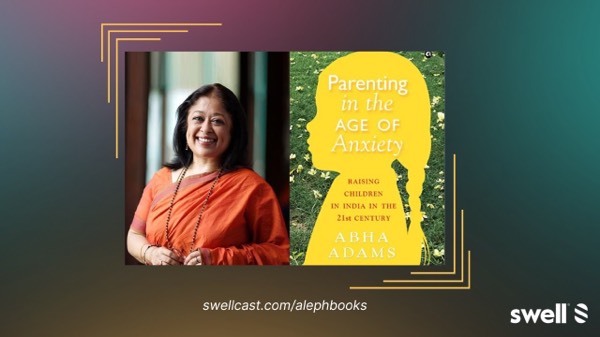
@Alephbooks
This is the offical Aleph Book Company Swellcast. We publish books of enduring literary quality. Pls visit:https://www.alephbookcompany.com/

Karan Dev
@Karan.Dev · 2:38
Parenting in the age of anxiety: In Conversation with author Abha Adams
Aba, it's such a pleasure to have you. This morning on swell. I want to start off with an important parenting lesson that many parents grudgingly acknowledge, and that is that you can't parent alone. It really does take a village to raise a child. Not just our family and friends, but an entire community, to see life through different perspectives and go through the diverse spectrum of human experience
abha adams
@abhaadams · 4:53
There was no underlying sense of fear and anxiety on the part of our parents that something would happen. I know that times have changed and I know that there is an underlying fear and definite anxiety about where our children are all the time and whether they are safe. This safety, the security of our children being safe, has unfortunately been taken away from our young parents today

Karan Dev
@Karan.Dev · 0:38
It truly is all about effort and perseverance. Ava and a lot of parents agree that the toddler years and the adolescent years are similar because these are times when children need to become more autonomous and become their own people. And one of the most common, normal ways that they do it is when you're saying yes, they absolutely have to say no. Even when they actually want to say yes, they sometimes say no just so they can be different. They feel that they are their own person
abha adams
@abhaadams · 5:00
Why are you saying no? And there could be a valid reason, not at the two, you know, not when there's two and a half, but certainly when you're four. So that's one suggestion that I have, but above all, not to get irritated and angry. And if you smile at the know, they realize that they haven't been able to press that irritate mom button that they know so well. But when it comes to adolescence, it's slightly different. There

Karan Dev
@Karan.Dev · 0:42
I completely agree with your point about using reason and logic to really have important conversations with children in these formative years and Ava, in your book you emphasize on connection and conversation for a healthier family relationships. You also talk about the importance of being a parent who is emotionally attuned to their child and tries to understand the reason behind the child's behavior
abha adams
@abhaadams · 5:00
Thank you, Karen. I actually have used the words connection, conversation, communication and dialogue quite extensively in the book, and I truly believe that for a healthy, strong, understanding relationship with your children or your child over the years can only stem from these critical pieces. Now, how do we connect, how do we converse, how do we communicate? And more critically, how do we dialogue? I think in many ways we've lost the art of all these things

Karan Dev
@Karan.Dev · 0:57
I will post a final summary after your response. But it's been such a pleasure listening to you about this crucial topic and how we deal with children and how they kind of grow up and evolve as time goes by. So thank you so much and I'm really looking forward to your final response
abha adams
@abhaadams · 5:00
The thanks are all minecran. And I think this is just a compendium of all my parenting mistakes in the past. But you've picked up on the very important subject of boundaries. And I'd like to start off by saying that unless we teach boundaries to our children, and I'll define it in a moment, they aren't going to be able to navigate this world for children. They need to understand what is acceptable, what is inappropriate, and where there is absolutely zero tolerance

Sreeja V
@Wordsmith · 2:44
That is, the attitude is to do things when told and not to be self motivated, to be proactive, come forward and take up responsibility, to be better organized, to ask if someone in the house needs help with doing chores, et cetera, et cetera. Is that very far fetched, a dream or a wish to even have? Or are kids likely to be so in the presence of parents and they might probably handle a situation better or be more proactive outside of home?
abha adams
@abhaadams · 3:47
So I have heard many times, and I've seen my son, that when he's in other people's homes, he is the absolute epitome of kindness and respectfulness and he will set the table, he will pick up his plate after him. And they're always better when they're not with us or not in our circle of being an influence. And I suppose it's because they make the effort at that time

Sreeja V
@Wordsmith · 1:21
The problem is only when he is at home, and I guess he has more comfortable being their own self around us. So that explains it. I have already sent an email to you, look forward to your response and would love to stay connected. I hope I can make it to the book launch. I'm not sure if it is in Bangalore, I stay further down south. So let's see. I look forward to your email and then we'll take it forward from there
